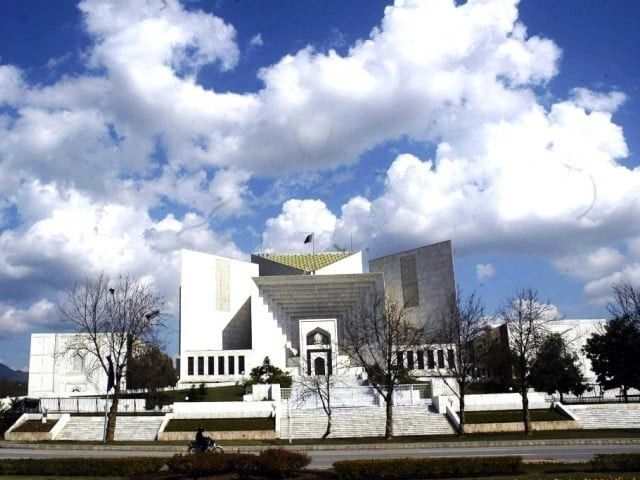Treason trial: Complete Musharraf’s trial first, SC urged
Petitioner moves SC; says govt may be directed to probe role of abettors

Supreme Court. PHOTO: EXPRESS/FILE
A lawyer has requested the apex court to first complete the high treason trial of former military ruler Pervez Musharraf, who is accused of subverting the Constitution on November 3, 2007.
Rawalpindi District Bar Association’s former president Taufiq Asif has filed the appeal in the Supreme Court against rejection of his petition by the Islamabad High Court (IHC).
In his earlier petition, Asif had challenged the special court’s November 21, 2014 order, which directed the government to include the names of Shaukat Aziz, Zahid Hamid and Abdul Hameed Dogar – respectively prime minister, law minister and chief justice at the time – as Musharraf’s co-accused.
The petitioner had requested that first, the trial against Musharraf be completed.
He had said the federal government could be directed to take into account the role of various facilitators and abettors in the proclamation of emergency.
The petitioner had expressed apprehension that the special court’s November 21, 2014 order was an attempt to frustrate the trial by opening floodgates of alleged co-accused persons, adding that the judgment would cause delay in Musharraf’s trial.
However, the high court on November 10 rejected his plea on the ground that he had no locus standi.
Taufiq Asif, challenging the IHC order, is now seeking direction to the federal government for filing complaint under Article 6 of the Constitution against Musharraf.
He says that in view of the scheme of Articles 199 as well as 184 (3) of the Constitution, any person who is primarily interested in the proceedings of a case dealing with the supremacy of the Constitution and the rule of law can file a petition. He contends that relief as claimed for has been denied to him without any lawful authority and jurisdiction.
The three-judge special court will resume hearing of the high treason case today (Thursday). However, Justice Faisal Arab, who was heading the special court, will not be on the bench as he has been elevated as a Supreme Court judge.
Under section 4 of the Criminal Law Amendment (Special Court) Act 1976, if any member of the special court is for any reason, unable to attend any sitting in the course of a trial, the trial is continued before the other two members.
However, sub-section 2 of section 4 of the same Act says that if any member of the special court through death, illness, or any other reason is unable to continue to perform his functions, the federal government by notification may declare the office of such member was vacant and appoint another person qualified to hold the office.
At present, Justice Tahira Safdar and Justice Yawar Ali are the members of special court.
Published in The Express Tribune, December 17th, 2015.



















COMMENTS
Comments are moderated and generally will be posted if they are on-topic and not abusive.
For more information, please see our Comments FAQ